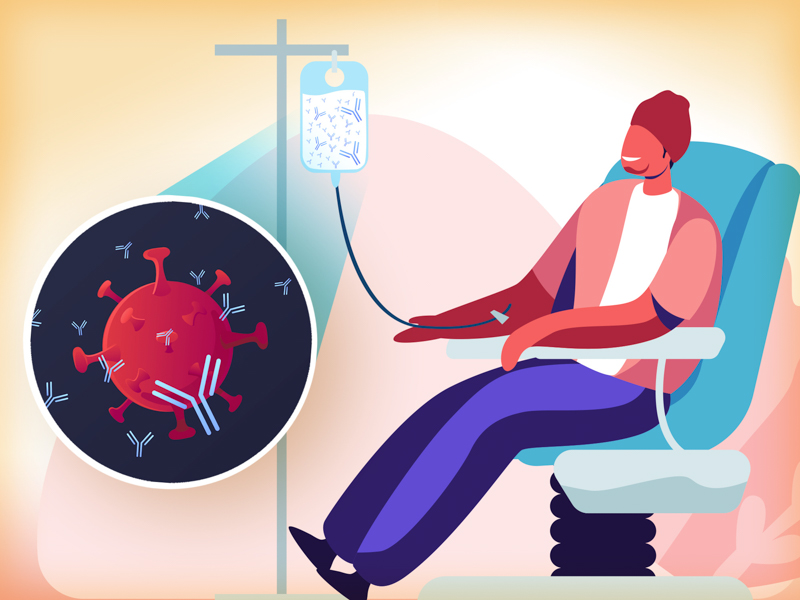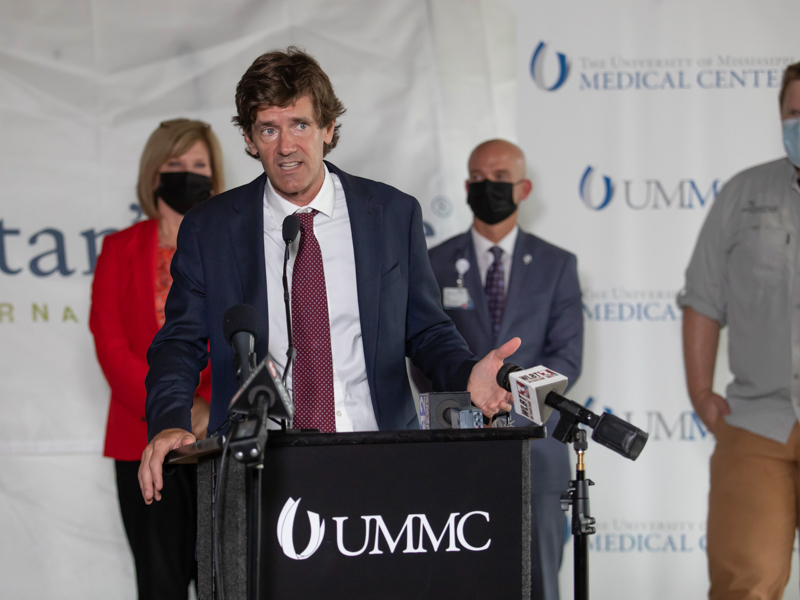
How monoclonal antibodies fight COVID-19
Published on Monday, August 23, 2021
By: Karen Bascom
COVID-19 vaccines can prevent the worst scenarios associated with the infection: mechanical ventilation, limb amputation, organ failure and death. However, there is also safe, effective treatment for the disease that can keep you out of the hospital or save your life.
Monoclonal antibodies, or mAb, are administered through an infusion or a series of injections. Like your own immune system’s antibodies, they recognize, bind to and neutralize infectious agents. This treatment contains one or two kinds of antibody that researchers know work best against the virus.

Dr. Gailen Marshall, R. Faser Triplett Chair of Allergy and Immunology, says the human immune system is polyclonal, meaning it produces many types of antibodies in response to infection and vaccination. These antibodies come from immune cells called b-cells. Each b-cell produces only one kind of antibody and makes many copies of it.
“However, only two or three of those antibody types might be effective at neutralizing the virus,” Marshall said.
In the case of SARS-CoV-2, the most effective antibodies are those that attach to the viral spike protein’s receptor binding domain. This stops the virus from invading a cell and using its machinery to make more copies of itself.
These high-achieving natural antibodies are the basis for the COVID-19 mAb. Scientists clone them to “make massive amounts of one kind of antibody directed at one part of the virus,” Marshall said, hence the name monoclonal. Patients receive these lab-made mAbs to fight infection more efficiently than their polyclonal immune system might otherwise.
Physicians have used monoclonal antibody-based therapies for decades. First developed to prevent transplant rejection, mAb can treat cancers, autoimmune disorders, infections, and even migraines.
“The commonality between all of the treatments is that they either take out or block an interaction [between your body and an infectious agent] that allows the body to heal,” he said.
Researchers recognized the potential to use mAb treatment against SARS-CoV-2 early in the pandemic. They studied the immune responses of COVID-19 patients and selected mAb candidates for clinical trials.
UMMC participated in two clinical trials for anti-SARS-CoV-2 mAb treatments. One product, Regeneron’s casirivimab and imdevimab cocktail, received Emergency Use Authorization in November 2020.
“In COVID-19, we see the immune system attempt to fight off the virus and the system overreacts, which produces what’s called a cytokine storm, and that can exacerbate the lung disease that occurs with COVID-19,” Marshall said in April 2020 at the start of UMMC’s clinical trials. “If effective, the antibodies will block the cytokines and lessen the damage.”

State Health Officer Dr. Thomas Dobbs has consistently encouraged monoclonal antibody treatment.
“It could save your life,” Dobbs said on August 17.
“When you start monoclonal antibody treatment early in the course of the disease, your body can stop the infection before the damage is done,” Marshall said.
Or, as he analogizes: “If you see a waste can on fire, you might be able to put it out with a glass of water if you act right away. If you wait until the fire is spreading up the wall that glass of water isn’t going to put the fire out.”
MAB treatment can be given to people that meet health criteria that put them at elevated risk of developing severe COVID-19. This includes all people aged 65 or older. It also includes people age 12 and older who have conditions such as diabetes, cardiovascular disease, or cancer.
All these conditions are associated with an increased risk of COVID-related hospitalization or death. Prioritizing monoclonal antibody treatments for this group is a way to do the most good with a limited resource, Marshall said.

“It’s the same approach we used with vaccination efforts, where we started with the most high-risk individuals,” he said. “When the supply of monoclonal antibodies increases, those limitations may not exist.”
“We know that monoclonal antibody treatments may help patients avoid progression of mild symptoms into severe disease requiring hospitalization or leading to death,” said Dr. Alan Jones, associate vice chancellor for clinical affairs and COVID-19 clinical response leader.


